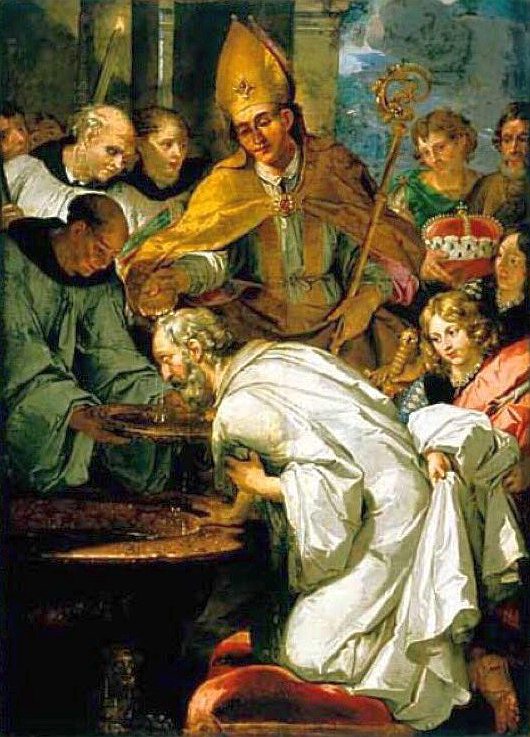

St. Rupert is believed to have been of Frankish birth, and perhaps of the Merovingian royalty; but he was still more illustrious for his learning and the illustrious virtues he practiced from his youth. He exercised himself in austere fasting, watching, and other mortifications; he was a great lover of chastity and temperance, and so charitable as always to impoverish himself to enrich the poor. His reputation drew persons from remote provinces to receive his advice and instructions. He removed all their doubts and scruples, comforted the afflicted, cured the sick, and healed the disorders of souls.
So distinguished a merit raised him to the episcopal See of Worms. But that people, being for the most part idolaters, could not bear the luster of such sanctity, which condemned their irregularities and superstitions. They beat him with rods, loaded him with all manner of outrages, and expelled him from the city. But God prepared for him another harvest.
(We have already seen, in the article on Our Lady of Altötting in Issue No. 205, that the age during which St. Rupert lived and worked for the salvation of souls has been disputed. It was formerly believed that it was perhaps during the late 6th to the early 7th century; but now it is believed more probable that it was the late 7th to the early 8th century. The best documentary evidence, including a list of the Bishops of Salzburg, favors the later time period.)
The report of the bishop's ability reached Duke Theodo of Bavaria (which Theodo is also disputed –
while some say it was Theodo II or III, it seems more probable that it was Theodo VI). Theodo sent messengers to
St. Rupert with the request that he should come to Bavaria to revive, confirm, and propagate the spirit of Christianity there.
Despite the work of early missionaries – the Christian Faith had been planted in that region nearly two hundred years before
by St. Severinus – Bavaria was only superficially Christian; its very Christianity
was indeed to some extent Arian, while heathen customs and views were most closely interwoven with the externals of
Christianity which it had retained. St. Rupert acceded to Theodo's request, after he had by messengers made himself
familiar with the land and people of Bavaria.
 St. Rupert was received (ca. 696) with great honor and ceremony by Theodo in his residential city of
Ratisbon (Regensburg). He found the hearts both of the nobles and people docile to the preaching of the Word of God.
Bagintrude, sister of Duke Theodo, being a Christian, had disposed her brother and the whole country to receive the true Faith.
St. Rupert, with the help of other zealous priests whom he had brought with him, instructed and, after a general fast,
baptized Duke Theodo and the lords and people of the whole country. (As was noted in Issue No. 205, it is believed that the
original octagonal chapel of Altötting was the baptistery used by St. Rupert, and that he or Theodo provided that chapel with
the original statue of Our Lady of Altötting.)
St. Rupert was received (ca. 696) with great honor and ceremony by Theodo in his residential city of
Ratisbon (Regensburg). He found the hearts both of the nobles and people docile to the preaching of the Word of God.
Bagintrude, sister of Duke Theodo, being a Christian, had disposed her brother and the whole country to receive the true Faith.
St. Rupert, with the help of other zealous priests whom he had brought with him, instructed and, after a general fast,
baptized Duke Theodo and the lords and people of the whole country. (As was noted in Issue No. 205, it is believed that the
original octagonal chapel of Altötting was the baptistery used by St. Rupert, and that he or Theodo provided that chapel with
the original statue of Our Lady of Altötting.)
God confirmed his preaching by many miracles. He also converted the neighboring countries to Christianity. After the capital Ratisbon, the second chief seat of his labors was Lauriacum (now called Lorch – a district of the city of Enns, Austria), where he healed many diseases and made many converts. However, it was neither of these places, but rather the old Roman town of Juvavum – then nearly in ruins, but now the beautiful city of Salzburg, Austria – which St. Rupert chose for his episcopal See. Duke Theodo adorned and enriched it with many magnificent donations, which enabled St. Rupert to found there several churches and monasteries. At the foot of the precipice of the Mönchberg, where once St. Maximus, a disciple of St. Severinus, had suffered martyrdom with his companions (476), St. Rupert erected the first church in Salzburg, the Church of St. Peter, as well as a monastery. Upon the lofty prominences to the southeast of the town (Nonnberg), where the old Roman fortress once towered, he established a convent of nuns which, like the monastery at the Mönchberg, he placed under the protection and the Rule of St. Benedict.
To set his institutions upon a solid basis, St. Rupert repaired to his home country, and returned with twelve companions besides his niece, St. Ehrentraud, whom he made Abbess over the convent of Nonnberg, while he and his companions were the first monks of the Salzburg (Mönchberg) monastery. St. Rupert was thus the first Abbot-Bishop of Salzburg, for, as he established his foundations after the manner of the Irish monks, he combined in his own person the dignities of Abbot and Bishop. This twofold character of the Bishop continued in Salzburg for nearly 300 years.
St. Rupert thenceforth devoted himself entirely to the work of salvation and conversion which he had already begun. After a life of extraordinarily successful activity, he died at Salzburg, traditionally on Easter Sunday – March 27, circa 718. His body reposed in Salzburg at St. Peter's Church until September 24, 774, when his disciple and successor, Abbot-Bishop St. Virgil, had a portion of his relics removed to the Cathedral. On September 24, 1628 these relics were interred by Archbishop Paris von Ladron under the high altar of the new Cathedral. Since then the city and district of Salzburg have solemnized the feast of St. Rupert on the day of his translation – September 24, while the Roman Martyrology notes the day of his death – March 27.
NEW: Alphabetical Index
Contact us: smr@salvemariaregina.info
Visit also: www.marienfried.com